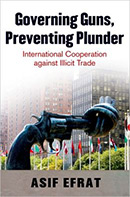Governing Guns, Preventing Plunder: International Cooperation against Illicit Trade
 Author: Asif Efrat
Author: Asif Efrat
Publisher: New York: Oxford University Press, 2012. 384p.
Reviewer: Marissa Mandala | March 2013
Asif Efrat’s Governing Guns, Preventing Plunder: International Cooperation against Illicit Trade is an engaging discussion of the complicated issues surrounding nations in addressing and regulating diverse forms of illicit trade. Efrat begins the book by outlining a theoretical framework that can be applied to the explanations of various cooperation efforts against illicit trade. The basis of his theoretical framework rests in the liberal theory of international relations; however, he incorporates the realist element of power distribution, noting that the framework would be incomplete without the inclusion of this element.
At the core of the framework, Efrat argues that international regulation against illicit trade is explained by the variation in government preferences. He further explains that government preferences are influenced by four main factors: primary negative externalities (the trade’s negative effects inside a country), secondary externalities (the trade’s negative effects on other countries), the concerns of exporters and the concerns of consumers. Efrat notes that the cooperation problem arises from these conflicting preferences and the absence of shared interests between governments in regulating illicit trade. This problem can be overcome and cooperation can be achieved by a shift in government preferences over time, as well as by coercion. With regards to the distribution of power among governments, he describes how campaigns against illicit trade that are led by powerful governments do not necessarily succeed, and those led by weaker governments do not necessarily fail.
In the book’s subsequent chapters, Efrat details the complications surrounding international cooperation in combating specific forms of illicit trade, and further explains these intricacies by aligning the theoretical framework to the issues of human trafficking, small arms trafficking, and the illicit trade in looted antiquities. In the examination of each of these issues, Efrat elaborates on the history of the international cooperation efforts and then discusses the reasons that cause certain countries to become more involved than others in advocating for or against the regulation of a particular illicit trade. The complexities of these reasons become apparent as Efrat discusses how it is not unusual for nations to fully support the strong regulation of one particular illicit trade but at the same time not fully support or even oppose the regulation of a different illicit trade. An example of this situation is apparent in the United States’ strong stance regarding the regulation of human trafficking, and its relatively weak stance regarding the regulation of small arms trafficking.
A particularly interesting element of international cooperation described in the book is the role that the humanitarian interests of governments play in the regulation of illicit trade. Efrat notes that some countries can become involved in a trade’s regulation, even if not directly affected by that trade, as a result of humanitarian concerns as well as by pressure from the public or NGOs. The United States’ role in advocating for regulations against human trafficking is an example of this. Similarly intriguing is Efrat’s discussion of the role that legal actors play in illicit trade. He notes that legal actors are often entangled in illicit trade, and as a result, legal actors can hinder efforts to effectively combat illicit trade.
Governing Guns, Preventing Plunder: International Cooperation against Illicit Trade provides a thorough analysis of the various factors that contribute to international cooperation and regulation efforts against illicit trade. Efrat clearly outlines a theoretical framework and demonstrates how it is applicable to various forms of illicit trade, concentrating on human trafficking, arms trafficking, and the illicit trade in looted antiquities. He concludes the book by examining the extensions of the framework and its application to international cooperation against the drug trade, money laundering and counterfeits. Efrat effectively supports his arguments by providing the reader with a comprehensive understanding of the history behind international cooperation efforts for each illicit trade that he examines in detail. The presentation of the material is comprehensive, yet the information does not overwhelm the reader as the author makes sure to define any terms that may be unfamiliar to a non-academic reader. The engaging and organized nature of the text allows the reader to easily understand and learn about the issues at hand, allowing for all audiences – including those outside of academia – to absorb and appreciate its content.
Marissa Mandala, Graduate Student, University of Pennsylvania


